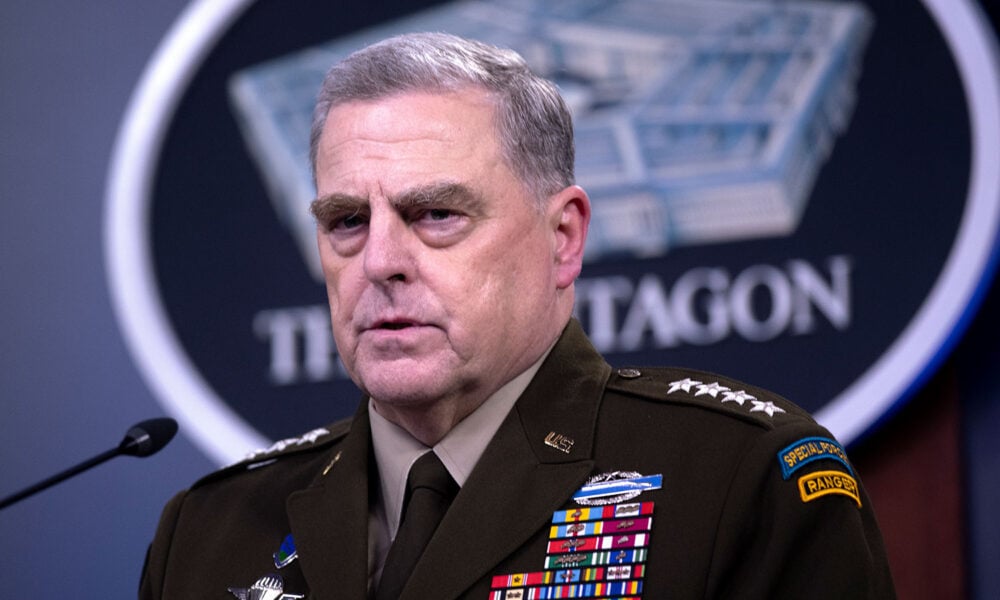In the later days of the previous administration, the senior uniformed official in the US military, Chairman of the Joint Chiefs of Staff General Mark Milley was deeply concerned about President Trump’s stability. Among other things, he actively planned to intervene if the president gave an order to launch nuclear weapons. According to an account in the recently released book Peril, Milley told senior military officers that although the president alone could give such an order, Milley also needed to be involved. He then asked them to confirm this understanding, which he considered to be an “oath.”
Regardless of any agreement Milley may have had with these senior officers, however, the truth is that he had no actual authority to compel them to involve him in such a decision. In the United States, the sole authority to order the use of nuclear weapons belongs to the president. While the assumption is that, given the critical importance of such a decision, any president would consult with advisers before ordering a nuclear strike, there is no requirement to do so.
For those who follow these things, the reporting on Milley’s informal workaround immediately raised parallels with stories about President Nixon during the Watergate scandal. In the 1970s, top officials, including Nixon’s Secretary of Defense, James Schlesinger, were concerned that President Nixon, under immense strain and drinking heavily, might act irrationally. Schlesinger reportedly instructed the Joint Chiefs of Staff at the time that “any emergency order coming from the president”—such as a nuclear launch order—should go through him or Secretary of State Henry Kissinger first. As in the case of Milley, however, Schlesinger had no real authority to give this instruction, and it is not clear what would have happened if the president had actually given such an order.
These cases, involving presidents who had obvious tendencies toward unpredictable behavior, understandably raise public alarm, and frequently prompt surprise that others are not officially involved in the process to launch nuclear weapons, hundreds of which are on hair-trigger alert and can be launched in just minutes. Back in 1976, Congress was concerned enough to hold hearings on the president’s sole authority to order a nuclear launch; the next hearing on the subject did not happen until 2017.
But those two isolated cases, as compelling as they may be, distract from the fact that sole authority is a problem even when there are no serious concerns about a president’s mental state. The decision to put the authority to launch a nuclear attack in the hands of one person was made under a very specific set of circumstances during the Cold War. But those circumstances—real fear of a surprise attack from the Soviet Union, uncertainty that the US would retain enough nuclear weapons and reliable control and communications to launch them after suffering a first strike—have not existed for decades.
There is an obvious, and easy, way to put an end to this problem: revise the system for ordering a nuclear launch to require participation by more than one person. That would permanently remove the concern that any single individual could start a war that could end in unfathomable death and devastation. There are many proposals for how this could be done, including one put forward by UCS.
The UCS proposal would require the consent of two other high-level officials in the presidential line of succession to carry out any presidential order to launch a nuclear attack. The Federal Emergency Management Agency already continuously tracks the locations of officials in the presidential line of succession. This same tracking and communication system could be used to involve them in a nuclear launch decision. Such a system would not require developing consensus among those involved, but rather simply a yes/no vote on the attack plan proposed by the president. If either official felt that the order was not legal under the Law of Armed Conflict, that the president was not mentally fit to issue such an order, or if they felt a nuclear war was unwise, they could veto the order.
Ending sole authority would make the US—and the rest of the world—safer.
In a separate but additional important consideration, giving any one person unchecked authority to make such a decision is not compatible with a democratic system founded on the idea of checks and balances.
More broadly, the idea that one person could make this decision perpetuates the injustice and inequity of the nuclear weapons system as a whole. The community of those who make decisions about nuclear weapons—from their production to their use—has historically been highly exclusive. Even today it includes few members of the communities that have been disproportionately impacted by nuclear weapons activities, such as Indigenous communities, communities of color, low-income, and rural communities.
The decision to order a nuclear launch is potentially the most important decision this nation could make, with grave consequences for everyone alive both in the United States and in the world. It should be made only with the utmost caution and consideration of its humanitarian as well as military implications. Especially in a democracy, this is not a decision that should be left up to any single individual. As the title of an op-ed by former Defense Secretary William Perry says, “Who Can We Trust with the Nuclear Button? No One.”

